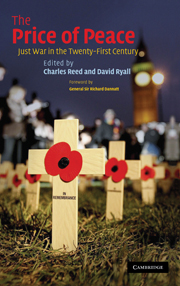Book contents
- Frontmatter
- Contents
- Notes on contributors
- Foreword by Richard Dannatt
- Acknowledgements
- 1 Introduction
- PART I A framework for ethical decision making: state and civil society-based approaches
- PART II Responding justly to new threats
- PART III Fighting wars justly
- PART IV Securing peace justly
- PART V Concluding reflections
- 15 A US political perspective
- 16 A British political perspective
- 17 An American military ethicist's perspective
- 18 A British theological perspective
- Bibliography
- Index
17 - An American military ethicist's perspective
Published online by Cambridge University Press: 03 December 2009
- Frontmatter
- Contents
- Notes on contributors
- Foreword by Richard Dannatt
- Acknowledgements
- 1 Introduction
- PART I A framework for ethical decision making: state and civil society-based approaches
- PART II Responding justly to new threats
- PART III Fighting wars justly
- PART IV Securing peace justly
- PART V Concluding reflections
- 15 A US political perspective
- 16 A British political perspective
- 17 An American military ethicist's perspective
- 18 A British theological perspective
- Bibliography
- Index
Summary
Lance Corporal Gregory MacDonald of the US Marine Corps never believed there were weapons of mass destruction in Iraq. Armed with a master's degree in philosophy and well-versed in the just war tradition, he rejected the claim that Operation Iraqi Freedom was launched as a last resort to check Saddam's aggression. Before deploying to Kuwait with his light armoured vehicle (LAV) unit, Greg participated (out of uniform) in an anti-war rally in Washington, DC, and gave an anonymous radio interview expressing his mistrust of the motives of the Bush administration.
Greg was killed on 25 June 2003, near the town of al Hillah, Iraq, as his LAV raced to assist another Marine unit that had been ambushed by Saddam loyalists. I learned of his death three days later, shortly after my wedding reception. The night before, at the rehearsal dinner, my maid of honour had read a toast Greg wrote in the desert for my husband and me. Its theme was a Muslim greeting he had heard in Iraq: ‘a Salam a lakum’, which may be translated, ‘Peace be with you’, or ‘God grant you peace.’ Greg explained that the greeting is ‘not just a blessing for the absence of conflict, but also for compassion, repose, calm; it implies a desire for an understanding of the self and for the humanity of the other; it signifies a willingness both to trust and to accept the trust of another; it is an offering for what is just, what is fair.
- Type
- Chapter
- Information
- The Price of PeaceJust War in the Twenty-First Century, pp. 295 - 303Publisher: Cambridge University PressPrint publication year: 2007



